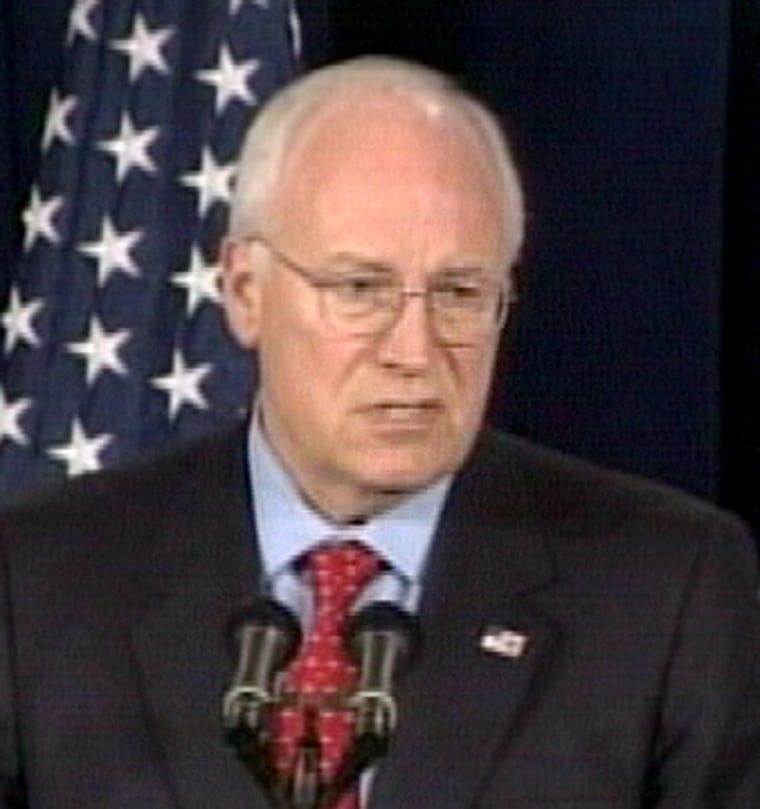Vice President Dick Cheney on Monday called presidential candidate John Kerry “one of the most reliable pro-tax votes in the Senate” and asserted the Democrat would sweep away a host of tax cuts if elected.
Cheney claimed that Kerry had voted for higher taxes some 350 times in his Senate career and was likely to seek huge tax increases to help pay for nearly $1 trillion in spending proposals.
“That averages to one vote for higher taxes every three week for almost two decades. At least the folks from Massachusetts knew who was on the job,” Cheney told a receptive audience at the U.S. Chamber of Commerce.
The Kerry campaign called Cheney’s allegations misleading and said that Kerry had fought throughout his career for middle-class tax relief. “Like Bush, Cheney has no credibility to lecture anyone on the economy,” the campaign said in a statement issued Monday.
Bid to boost Bush's standing on economy
Cheney’s sharp attack was an attempt by President Bush’s re-election campaign to shore up the incumbent’s standing on handling the economy. Kerry has tried to outflank Bush on tax cuts in recent weeks, promising to lower corporate tax rates and saying that he and the president agree on the need to extend some personal income tax cuts due to expire this year.
One major difference between the candidates is on taxing the wealthiest. Kerry would repeal cuts for Americans who earn more than $200,000 a year.
“He has given the usual assurances that in those first 100 days he’s planning, only the wealthiest Americans can expect higher taxes,” Cheney said. “But voters are entitled to measure that campaign promise against Senator Kerry’s long record in support of higher taxes for every income group.”
Cheney questioned Kerry’s commitment to extending tax cuts that are due to expire: an increase in the child tax credit; tax reductions for some married couples who would pay more than they would as individuals; and an expansion of the bottom 10 percent tax bracket. Kerry has said he would keep those tax cuts in place.
Cheney said Kerry voted against creating the new 10 percent bracket; against repealing the inheritance tax; against cutting taxes on dividend income; and against raising the amount of investment expenses that businesses can write off.
‘Less than half the truth’
The Kerry campaign accused the vice president of telling “less than half the truth” by cherry-picking a few votes that were part of the tax cuts Bush proposed in 2001 and 2003. Kerry opposed them because they primarily benefited the wealthy and contributed to record deficits, the campaign said.
“What Cheney didn’t say was that Kerry supported the middle-class alternatives to the Bush tax cuts,” the campaign said in a statement.
Bush is trying to build support on the economy, a politically vulnerable spot because the economic recovery has not yet translated into a surge in hiring.
Cheney offered an upbeat assessment of the economy, touting the job-creating powers of three Bush tax cuts and saying that manufacturing and home ownership are up and inflation and interest rates down.
Cheney said voters in November will be offered “a choice between a senator who has raised taxes and a president who has cut them. It is the difference between a senator who makes endless promises on federal spending and a president who insists on spending discipline in Washington, D.C.”
The Kerry campaign responded that the Bush-Cheney economic plan “has lost 3 million jobs, created spiraling budget deficits and put the nation in debt for generations to come.”
“The Bush-Cheney approach to the economy isn’t working, and Bush and Cheney are practically the only ones who continue to defend their failed economic policies,” the campaign said.
Bush, who spent a long weekend at his Texas ranch, plans to give speeches on the economy this week in the electoral battleground states of West Virginia and Wisconsin.
